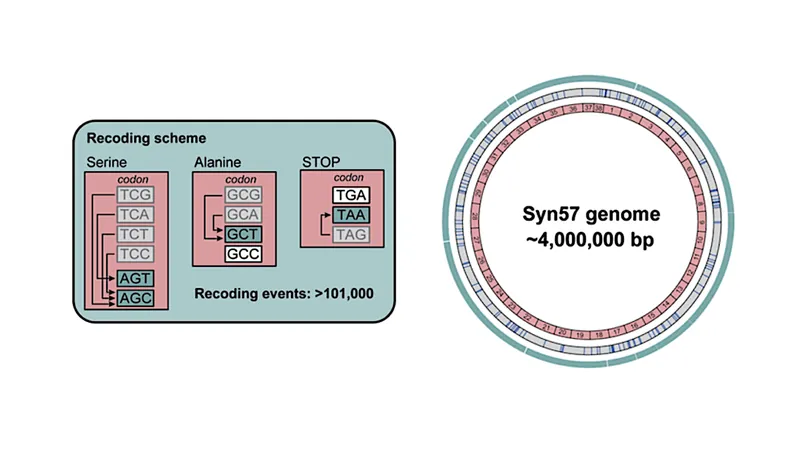
Unlocking Life's Code: Meet Syn57, the 57-Codon E. coli That Could Revolutionize Biology!
2025-08-27
Author: Jia
A Groundbreaking Leap in Genetic Engineering
For billions of years, life on Earth has thrived on a genetic code that relies on 64 triplets of DNA and RNA bases, known as codons, to construct proteins from 20 amino acids. But what if we could simplify this system?
Researchers led by the brilliant Jason Chin have taken an audacious step in synthetic biology, crafting a groundbreaking new strain of E. coli called Syn57, which distills the genetic code down to just 57 codons. This leap paves the way for a reimagined understanding of life itself!
From 61 to 57: The Path to Simplification
Building on their previous success with Syn61—a strain that successfully operates with only 61 codons—Chin's team embarked on an ambitious mission to further streamline the genetic code. Under the astute guidance of Wes Robertson and others, they removed crucial codons, including four for serine and several for alanine, replacing them with equivalents while recoding over 101,000 codons across a vast synthetic genome.
Innovative Techniques for Complex Challenges
To tackle this monumental task, the genome was dissected into 38 manageable fragments. Utilizing groundbreaking methods like homologous recombination in yeast and their innovative uREXER technique—a fusion of CRISPR-Cas9 and lambda-red recombination—the researchers effectively replaced the native genetic material with their synthetic construct.
This rigorous process also encountered challenges, flagging areas of the genome that were resistant to recoding or exhibited slowed growth. The team strategically tweaked coding sequences and gene structures to optimize outcomes, ensuring successful assembly of a fully synthetic organism.
Syn57: The Urgency of a Compressed Code
The end result, Syn57, stands as the most significantly recoded organism yet, proving that life can thrive on a dramatically compressed genetic code. Previous achievements with Syn61 demonstrated how these engineered strains could be reprogrammed to incorporate non-canonical amino acids, resulting in entirely new synthetic materials.
With Syn57 allowing for even greater flexibility in codon use, the possibilities to innovate in synthetic biology are endless. This could lead to groundbreaking advancements in drug production, making it resistant to viral infections which currently threaten manufacturing processes.
A Bright Future for Synthetic Biology
Backed by reputable funding sources including the UKRI MRC and the European Research Council, this research doesn’t just represent a scientific milestone; it offers a glimpse into the exciting future of synthetic biology.
As researchers strive to further expand this new genetic frontier, Syn57 might just be the key that unlocks revolutionary applications in biotechnology, pharmaceuticals, and beyond!


 Brasil (PT)
Brasil (PT)
 Canada (EN)
Canada (EN)
 Chile (ES)
Chile (ES)
 Česko (CS)
Česko (CS)
 대한민국 (KO)
대한민국 (KO)
 España (ES)
España (ES)
 France (FR)
France (FR)
 Hong Kong (EN)
Hong Kong (EN)
 Italia (IT)
Italia (IT)
 日本 (JA)
日本 (JA)
 Magyarország (HU)
Magyarország (HU)
 Norge (NO)
Norge (NO)
 Polska (PL)
Polska (PL)
 Schweiz (DE)
Schweiz (DE)
 Singapore (EN)
Singapore (EN)
 Sverige (SV)
Sverige (SV)
 Suomi (FI)
Suomi (FI)
 Türkiye (TR)
Türkiye (TR)
 الإمارات العربية المتحدة (AR)
الإمارات العربية المتحدة (AR)